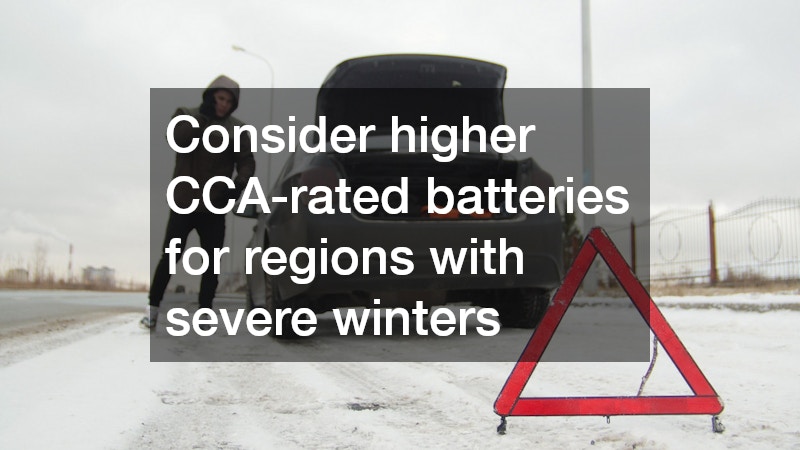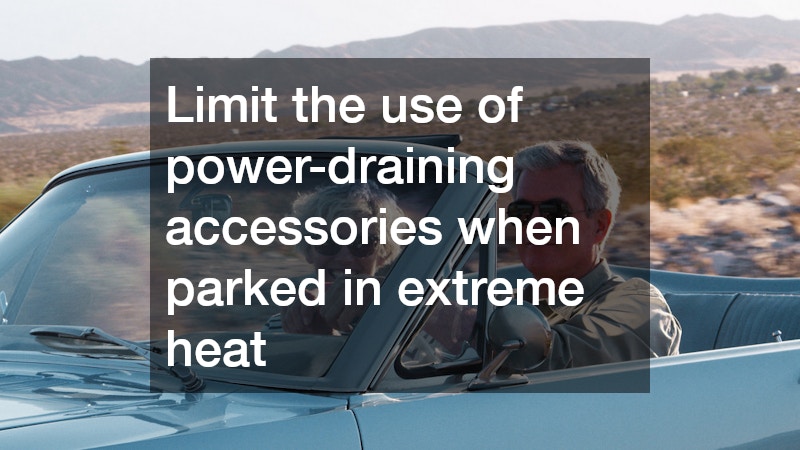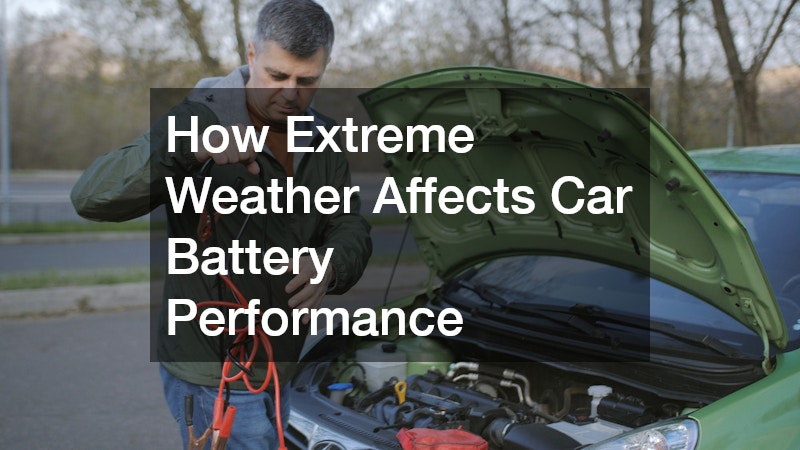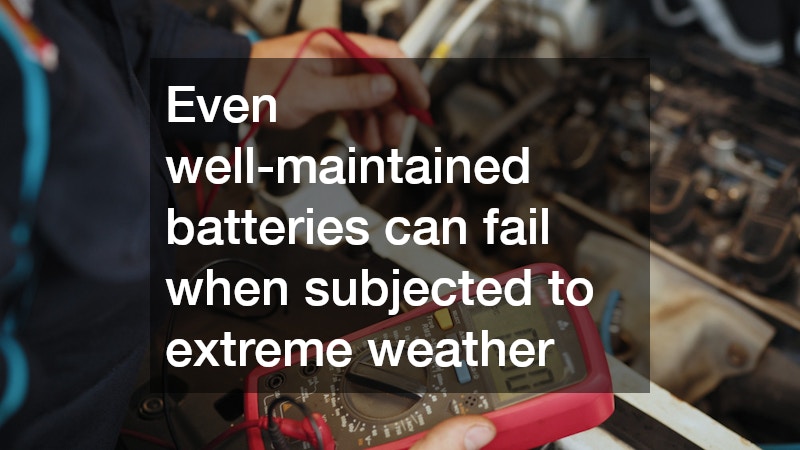Key Takeaways
-
Extreme cold slows chemical reactions, reducing battery cranking power; extreme heat accelerates corrosion and fluid loss.
-
Battery lifespan is shortened by repeated exposure to harsh temperatures.
-
Regular maintenance, including voltage checks, terminal cleaning, and proper mounting, improves performance in all climates.
-
Using climate-appropriate batteries and accessories like battery blankets or heat shields helps prevent failure.
-
Professional testing and replacement at a trusted battery store ensures optimal performance and longevity.
-
Short trips, undercharging, and neglect can worsen weather-related battery issues.
Your car battery is one of the most important components of your vehicle, yet it’s often overlooked until it fails. Batteries provide the electrical energy required to start your engine, power electronics, and operate crucial systems like the fuel pump, headlights, and climate control. Extreme weather conditions—both cold winters and hot summers—can significantly reduce a battery’s efficiency, shorten its lifespan, and even cause sudden failure. Recognizing the impact of temperature on battery performance and taking proactive steps can prevent inconvenient breakdowns and costly replacements.
Understanding how batteries respond to weather, identifying warning signs, and following proper maintenance tips are key to ensuring reliability. In some cases, visiting a reputable battery store for testing, replacement, or professional advice is the best course of action. Many battery stores offer climate-appropriate batteries, installation, and guidance tailored to your local conditions.
How Car Batteries Work
To understand the effects of extreme temperatures, it helps to know how batteries function. Most cars use lead-acid batteries, which store electrical energy through a chemical reaction between lead plates and sulfuric acid. When you turn the ignition key, this reaction releases electrons, creating the electric current needed to crank the engine.
Battery performance is influenced by several key factors:
-
Capacity: Measured in ampere-hours (Ah), capacity indicates how much energy the battery can store. Larger capacities are better for vehicles with high electrical demands.
-
Voltage: Standard automotive batteries produce 12 volts. A fully charged battery reads around 12.6 volts at rest. Voltage readings below this indicate weakening performance.
-
Cold Cranking Amps (CCA): This measures the battery’s ability to start an engine in cold weather. Higher CCA ratings are essential for regions with harsh winters.
Batteries are temperature-sensitive. Cold slows chemical reactions, reducing output, while heat accelerates reactions but damages internal components. Even well-maintained batteries can fail when subjected to extreme weather without proper care. Visiting a battery store to check ratings and ensure compatibility with your climate can help prevent these issues.
Cold Weather Effects on Car Batteries
Winter conditions are notoriously hard on batteries. When temperatures drop, chemical reactions inside the battery slow down, reducing the power available to start your engine. For example, at 0°F (-18°C), a fully charged battery may deliver only 50% of its rated cranking power. This can cause difficulty starting the car, dim headlights, and occasionally total battery failure.
Other cold-weather effects include:
-
Frozen Electrolyte: Weak or old batteries may have electrolyte that freezes, damaging plates and internal structures.
-
Sulfation: Partial discharges in cold weather can create lead sulfate crystals that permanently reduce battery capacity.
-
Short Drives: Frequent short trips in winter prevent the alternator from fully charging the battery, leaving it vulnerable.
Warning Signs of Cold Weather Battery Problems:
-
Slow engine crank when starting.
-
Clicking or rapid clicking sounds from the starter motor.
-
Dim or flickering headlights during ignition.
-
Dashboard warning lights indicating low battery voltage.
Cold Weather Maintenance Tips:
-
Keep the battery fully charged; a fully charged battery is less likely to freeze.
-
Park in a heated garage when possible or use insulated battery blankets.
-
Check electrolyte levels in non-sealed batteries and top off with distilled water if necessary.
-
Reduce the use of electronics during cold starts to conserve power.
-
Consider higher CCA-rated batteries for regions with severe winters.
-
Have your battery tested at a trusted battery store before the first cold snap to ensure optimal performance.
By taking these preventative measures, you can reduce the risk of winter battery failure and avoid being stranded in freezing conditions.

Hot Weather Effects on Car Batteries
While cold reduces a battery’s cranking power, extreme heat accelerates its degradation. High temperatures increase chemical reaction rates inside the battery, which may seem beneficial temporarily but ultimately damages internal components. Excessive heat can also cause electrolyte evaporation, exposing lead plates, increasing corrosion, and leading to short circuits or total battery failure.
Key risks of hot weather include:
-
Electrolyte Evaporation: Leads to reduced battery capacity and potential failure.
-
Internal Corrosion: Heat speeds up corrosion on plates and terminals, reducing efficiency.
-
Physical Damage: Extreme heat can cause battery cases to swell, leak, or rupture.
-
Under-Hood Temperatures: Vehicles parked in direct sunlight or with poor ventilation under the hood experience higher heat exposure, exacerbating damage.
Warning Signs of Heat-Related Battery Problems:
-
Bulging or swollen battery casing.
-
Fluid leaks or corrosion around terminals.
-
Unusual odors like sulfur or rotten eggs.
-
Difficulty starting the vehicle even if the battery is relatively new.
Hot Weather Maintenance Tips:
-
Park in shaded areas or garages to reduce heat exposure.
-
Keep battery terminals clean, tight, and corrosion-free.
-
Inspect your battery regularly, especially during heat waves.
-
Consider heat-resistant batteries if you live in hot climates.
-
Limit the use of power-draining accessories when parked in extreme heat.
-
Visit a battery store for professional testing and recommendations on heat-tolerant battery options.
Even though heat can temporarily improve battery performance, long-term exposure shortens battery life and increases the likelihood of failure.

How Extreme Weather Affects Battery Lifespan
Temperature extremes significantly impact battery lifespan. Under normal conditions, car batteries last 3–5 years. However, exposure to consistent heat or cold can shorten that significantly. In extremely hot climates, batteries may fail after just 2–3 years due to accelerated chemical degradation. In cold climates, while calendar lifespan may be longer, performance issues during winter can make batteries seem weaker or unreliable.
Factors That Affect Battery Lifespan in Extreme Weather:
-
Repeated exposure to temperature swings stresses battery materials.
-
Older batteries degrade faster under extreme conditions.
-
Lack of maintenance, including allowing the battery to remain undercharged, accelerates wear.
Practical Takeaway: Maintaining battery health with inspections, clean terminals, and professional testing at a battery store is essential to prevent unexpected failure.
Preventative Maintenance Tips for Extreme Weather
Proactive maintenance can extend battery life in both hot and cold climates. Following these steps helps ensure reliability and avoids costly replacements:
Essential Battery Maintenance Tips:
-
Test Voltage Regularly: Use a multimeter to check battery voltage monthly; fully charged batteries should read ~12.6 volts.
-
Clean Terminals: Remove corrosion using a terminal brush and a baking soda solution.
-
Secure Mounting: Ensure the battery is firmly fastened to prevent vibrations and potential short circuits.
-
Avoid Short Trips: Longer drives allow the alternator to fully recharge the battery.
-
Use Battery Maintainers: Trickle chargers or smart maintainers keep batteries charged during long inactivity periods.
-
Check Electrolyte Levels: Non-sealed batteries should be topped off with distilled water.
-
Upgrade Appropriately: Consider batteries rated for your local climate.
-
Consult Professionals: A battery store can test, recommend, and install batteries suitable for your weather conditions.
Winter-Specific Tips: Use insulated blankets or park in heated garages.
Summer-Specific Tips: Use heat shields or park in shaded areas to reduce under-hood temperatures.
When to Replace a Battery Due to Weather Stress
Even with proper maintenance, extreme weather eventually wears down any battery. Knowing when to replace it is crucial to avoid being stranded.
Signs Your Battery May Need Replacement:
-
Sluggish engine starts or frequent jump-starts.
-
Swollen, leaking, or damaged battery casing.
-
Loose or corroded terminals.
-
Battery older than 3–5 years.
-
Voltage readings below 12.4 volts when fully charged.
When these signs appear, visit a battery store to have the battery tested professionally and replaced if necessary. High-quality battery stores often carry climate-rated batteries and provide installation services. Proactively replacing your battery before failure prevents emergencies and protects your vehicle’s electrical system.
Extreme weather has a significant impact on car battery performance. Cold temperatures slow chemical reactions, reducing cranking power, while heat accelerates corrosion and electrolyte evaporation. Both extremes shorten battery life and can lead to unexpected failures.
Regular inspections, proactive maintenance, and climate-appropriate batteries can greatly improve reliability. Simple actions like keeping terminals clean, checking voltage, using battery blankets or heat shields, and consulting a battery store for testing and replacement make a substantial difference. Being proactive ensures your vehicle starts reliably in any weather and extends your battery’s lifespan, saving money and stress in the long run.

